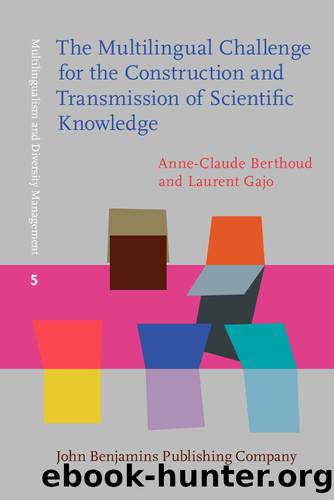The Multilingual Challenge for the Construction and Transmission of Scientific Knowledge by Berthoud Anne-Claude;Gajo Laurent; & Laurent Gajo

Author:Berthoud, Anne-Claude;Gajo, Laurent; & Laurent Gajo [Berthoud, Anne-Claude & Gajo, Laurent]
Language: eng
Format: epub
Publisher: John Benjamins Publishing Company
Published: 2020-10-20T11:05:35+00:00
6.2Variations on the theme of the body and disease (Lazare Benaroyo)
French has only one word (maladie) for disease/illness/sickness, and only one word (corps) for the body it dwells in. English, on the other hand, has three words for maladie: (1) âdiseaseâ, which defines it in terms of the organic and physiological disruptions it causes, (2) âillnessâ, which defines it in terms of its existential dimension, and (3) âsicknessâ, which defines it in terms of its social and cultural aspects.
In both French and English, these words refer to three representations of the wounded body: âdiseaseâ refers to the biological body seen as an object of science, âillnessâ refers to the lived-body, the locus where it is experienced, and âsicknessâ refers to the socialized body. In both languages, however, there is only one word for these various realities: corps in French, and âbodyâ in English. In German, on the other hand, âbodyâ can be denominated in two different ways. The word Leib, which means oneâs own body, points to the impossibility of dissociating the body from life; it reflects the unity of the singular being-in-itself, which is alienated by disease. This is a very distinct reality from that of the body-as-object: Körper in German.
These various words cover the full semantic âthicknessâ of the basic French notions of corps and maladie in the three languages. The English language reflects the fact that the wounded body is perceived as the site of (1) a biological dysfunction, (2) an existential crisis and (3) a social distress. It is this wealth of meaning that has to be kept alive, beyond words, in the dialogue between physicians and patients. Various registers of material reality and existence reflect the âshadowâ of the French words maladie and corps at the various moments in the care relationship. It is the focus on the full semantic depth of these words that brings to life and highlights the dialogue between the caregiver and the patient in the pursuit of the best care â a patient whose apparent passivity may be interpreted in this setting as patience, to quote Emmanuel Lévinas (1998:â¯93), that is, as an opening towards the other, â an original call for aid [â¦] an original opening toward merciful care, the point at which [â¦] the anthropological category of the medical, a category that is primordial, irreducible and, ethical imposes itselfâ. It is this ethical awakening that strikes physicians when the words corps and maladie are uttered. In connection with this, Guido Ceronetti was to write: âGoethe said that medicine has to embrace the whole of the physicianâs being, for its object is the whole of the human organism [â¦]. If the physicianâs moral life is not sufficiently diverse and elaborate, he would be unable to truly understand life-health-death-disease, and would never console his patients in an appropriate wayâ (Ceronetti, 1984:â¯128 and 163).
Thus, although French has only one word to express disease and only one word to express the diseased body, it can usefully borrow from English and German the
Download
This site does not store any files on its server. We only index and link to content provided by other sites. Please contact the content providers to delete copyright contents if any and email us, we'll remove relevant links or contents immediately.
Verus Israel: Study of the Relations Between Christians and Jews in the Roman Empire, AD 135-425 by Marcel Simon(551)
Infocracy by Byung-Chul Han(537)
Caesar Rules: The Emperor in the Changing Roman World (c. 50 BC â AD 565) by Olivier Hekster(529)
Europe, Strategy and Armed Forces by Sven Biscop Jo Coelmont(477)
Banned in the U.S.A. : A Reference Guide to Book Censorship in Schools and Public Libraries by Herbert N. Foerstel(444)
Reading Colonial Japan by Mason Michele;Lee Helen;(443)
The Roman World 44 BC-AD 180 by Martin Goodman(436)
Give Me Liberty, Seventh Edition by Foner Eric & DuVal Kathleen & McGirr Lisa(435)
DS001-THE MAN OF BRONZE by J.R.A(421)
The Dangerous Life and Ideas of Diogenes the Cynic by Jean-Manuel Roubineau(417)
The Oxford History of World War II by Richard Overy(414)
Introducing Christian Ethics by Samuel Wells and Ben Quash with Rebekah Eklund(412)
american english file 1 student book 3rd edition by Unknown(410)
Imperial Rome AD 193 - 284 by Ando Clifford(408)
Basic japanese A grammar and workbook by Unknown(389)
Literary Mathematics by Michael Gavin;(373)
Language Hacking Mandarin by Benny Lewis & Dr. Licheng Gu(351)
How to Reach the 9.0 in IELTS Academic Reading by IELTS Medical(333)
The Oxford History of the Renaissance by Campbell Gordon;(331)
